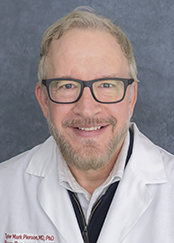Pierson Lab
The Pierson Neurogenetics Lab is devoted to understanding the pathological mechanisms involved in ultra rare and undiagnosed pediatric neurogenetic disorders. Tyler Mark Pierson, MD, PhD, has extensive experience in the phenotyping and diagnosing of rare neurogenetic disorders using modern genomic technologies. Dr. Pierson did a clinical fellowship in the Neurogenetics Branch of NINDS at the National Institutes of Health (NIH) and was a member of the Undiagnosed Diseases Program at the NIH. In addition to directing his lab, Dr. Pierson is the director of the Pediatric Neurogenetics Clinic at Cedars-Sinai.

Personal Statement
I am a physician-scientist with more than 20 years of clinical and basic science research experience focusing on rare neurogenetic disorders. My goals are to help families with these disorders in the clinic as well as studying the disorders in my laboratory. I did my research training in the laboratory of Bert O’Malley, MD, working with the mifepristone-inducible gene system for gene therapy. I then completed pediatric neurology training at the Children’s Hospital of Philadelphia, followed by a fellowship in neurogenetics at the National Institutes of Health, as well as being an early member of the Undiagnosed Diseases Program at NIH prior to moving to Cedars-Sinai. At Cedars-Sinai, I have worked to organize the Pediatric Neurogenetics Clinic. My lab research focuses on developing methods to better understand and treat neurodevelopmental and neurodegenerative disorders of childhood.
Tyler Mark Pierson, MD, PhD
Breakthrough Research
Rare neurogenetic disorders are often caused by mutations that alter the function of important genes involved in neurodevelopment, or genes that can lead to neurodegeneration. Many of the genes involved in neurodevelopmental disorders are crucial to the choreography of brain development leading to issues with cognition and behavior. Alternatively, pediatric neurodegenerative disorders occur after normal brain development with subsequent dysfunction of cells within the nervous system leading to their demise. Our group studies both types of these disorders with patient-derived IPSCs, inducible-neurons and cerebral organoids to provide insight into neurologic function, as well as researches therapeutic interventions for affected families.
Publications
Learn more about the recent research publications from the Pierson Lab.
Laboratory Team
Learn more about the scientists, faculty members, investigators and other healthcare professionals of the Pierson Lab, whose dedicated efforts lead to groundbreaking discoveries.
Job Opportunities
We are actively recruiting students and postdocs to be our colleagues and expand lab knowledge and expertise to make important breakthroughs.
Collaborations
The Pierson Lab collaborates with Cedars-Sinai investigators and partners with local federally qualified clinics and community-based organizations to enhance our research initiatives.
- Undiagnosed Diseases Network—National Institutes of Health and UCLA, Bethesda, MD
- Bert O’ Malley Lab and Sophia Tsai Lab—Baylor College of Medicine
- Juan Young Lab and Katherina Walz Lab—Miller School of Medicine, University of Miami
- Joel Mackay and Jacqui Matthews Lab—School of Life and Environmental Sciences, University of Sydney
- James Dowling Lab—Hospital for Sick Children, Toronto
- Stephen Traynelis Lab and Hongjie Yuan Lab—Emory University
- Donna Martin Lab—University of Michigan
- Franco Taroni Lab—Istituto Neurologico Carlo Besta
- Michael Ward Lab, NINDS, NIH—Bethesda, MD
- Weimer Labo—Sandford Research, Sioux Falls, South Dakota
- Michael Ibba Lab—Schmid College of Science & Technology
